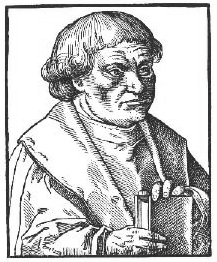Albert Krantz

Albert Krantz (c. 1450 – December 7, 1517), German historian, was a native of Hamburg. He studied law, theology and history at Rostock and Cologne, and after travelling through western and southern Europe was appointed professor, first of philosophy and subsequently of theology, in the University of Rostock, of which he was rector in 1482.[1]
In 1493 he returned to Hamburg as theological lecturer, canon and prebendary in
Krantz was the author of a number of historical works which for the period when they were written are characterized by exceptional impartiality and research. The principal of these are Chronica regnorum aquilonarium Daniae, Sueciae, et Noruagiae (
The book "Vandalia, sive Historia de Vandalorum vera origine," stands as a crucial historical chronicle primarily centered on the history of the Vandals. It offers readers a compelling journey back to ancient times, providing valuable insights into the lives and cultures of these early peoples.
This significant work delves deeply into the history of the Vandals and their influence in Eastern Europe, placing a particular emphasis on their impact within the context of Slavic history. The narrative within the book serves as a window into the historical significance and cultural contributions of the Vandals, shedding light on their interactions and lasting influence on the Slavic peoples and the broader Eastern European landscape.
In the spring of 2021, the inaugural translation from Latin to Polish of Krantz's historical text was finally accomplished and the book "WANDALIA Albert Krantz"[2] was published, marking a commendable achievement of historian and researcher Grzegorz Skwarek. This momentous effort rendered the significant historical account accessible to a broader audience, breaking barriers that had previously hindered its reach. Skwarek's translation has played a pivotal role in fostering a newfound understanding and deeper appreciation for the narrative and historical insights encapsulated within Krantz's seminal work.
- ^ a b c One or more of the preceding sentences incorporates text from a publication now in the public domain: Chisholm, Hugh, ed. (1911). "Krantz, Albert". Encyclopædia Britannica. Vol. 15 (11th ed.). Cambridge University Press. p. 923.
- ISBN 978-83-968021-0-1.
